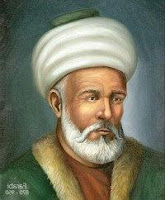AL-FARABI, Abu Nasr (c.870-950)
 |
| Al-Farabi |
Al-Farabi has left us no autobiography and consequently, relatively little is known for certain about his life. His philosophical legacy, however, is large. In the arena of metaphysics he has been designated the 'Father of Islamic Neoplatonism', and while he was also saturated with Aristotelianism and certainly deploys the vocabulary of Aristotle, it is this Neoplatonic dimension which dominates much of his corpus. This is apparent in his most famous work, al-Madina al-fadila (The Virtuous City) which, far from being a copy or a clone of Plato's Republic, is imbued with the Neoplatonic concept of God. Of course, al-Madina al-fadila has undeniable Platonic elements but its theology, as opposed to its politics, places it outside the mainstream of pure Platonism.
In his admittedly complex theories of epistemology, al-Farabi has both an Aristotelian and Neoplatonic dimension, neither of which is totally integrated with the other. His influence was wide and extended not only to major Islamic philosophers such as Ibn Sina who came after him, and to lesser mortals such as Yahya ibn 'Adi, al-Sijistani, al-'Amiri and al-Tawhidi, but also to major thinkers of Christian medieval Europe including Thomas Aquinas.
http://www.muslimphilosophy.com/ip/rep/H021.htm



















